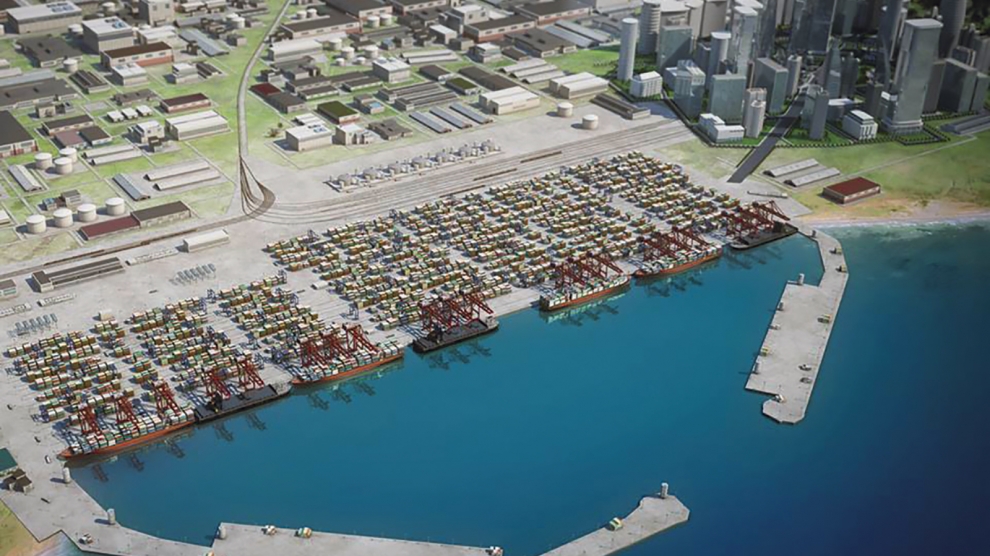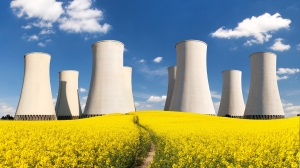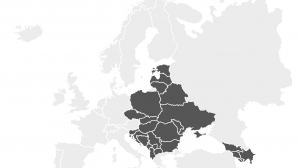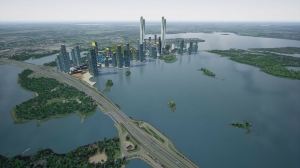“This is where Europe meets Asia, and that is what matters most. […] It is here and now that a new Georgia is being born. […] This place today lays the foundation of a new Georgia,” said Prime Minister Giorgi Kvirikashvili on December 24, 2017, launching construction work on Anaklia Deep-Sea Port.
“Anaklia port is very important for Georgia as it will position the route via the Caucasus on the radar of China and Europe,” Bruno Balvanera, director for the Caucasus, Moldova and Belarus at the European Bank for Reconstruction and Development (EBRD), tells Emerging Europe. “It will attract the further interest of foreign investors to develop a value chain route. It will consolidate Georgia as the logistics centre for the Caucasus. It will also consolidate its ties with both Europe and China as well as its immediate neighbours. All in all, it’s a very strategic project that can be a game changer in the medium term.”
A Long Time Coming
This 2.5 billion US dollar project, the largest in the country’s history, marks the beginning of the country’s transformation from a transit country into a logistics and industrial development hub.
“The Anaklia Deep-Sea Port is a long awaited project in Georgia,” Levan Akhvlediani, CEO at the Anaklia Development Consortium (ADC), a consortium of Georgia’s TBC Holding and Conti International — a US-based construction and development company which has been in business since 1906 and runs a number of large scale ventures worldwide. “There have been multiple initiatives and attempts to develop and construct a deep-sea port in Anaklia. However, none of them had been realised until 2016 when the ADC started developing this project.”
The first phase, estimated to cost 540 million US dollars and scheduled for completion within four years, will include construction of a 1.6-kilometre breakwater and a 625-metre quay. By 2021, Georgia is expected to handle 10,000 twenty-foot equivalent unit (TEU) as the port will have a depth of 16m and will be able to accommodate larger vessels. This will be a huge step as currently the Georgian ports can only handle a maximum of 1500 TEU vessels.
“The Anaklia Deep Sea Port will receive its first vessels by 2021 and will fully change the transportation and logistics landscape in Georgia by offering state of the art, reliable infrastructure and competitive costs,” said Ketevan Bochorishvili, CEO at Anaklia City and a former deputy minister of economy. “Complemented by the 3.5 billion US dollars to be spent by the government to upgrade the country’s road and rail infrastructure, Anaklia port will become a key transportation node between western Europe, the Caucasus, central Asia and north-western Iran,” Ms Bochorishvili adds.
In July 2017, the ADC appointed Seattle-headquartered SSA Marine, one of the largest terminal operators in the world, as the operator for Anaklia Deep Sea Port. The company oversees more than 250 strategic operations across five continents, servicing 27.2 million containers and managing terminals in nine different countries.
“We are proud to be a partner in such a promising and ambitious project such as Anaklia Deep Sea Port. A modern deep-sea, all weather port is exactly what Georgia requires to become a true logistics hub,” says Bob Watters, senior vice-president at SSA Marine. “The prospects for cargo growth in Georgia and central Asia along the Southern Corridor are very exciting.”
“The fact that such a powerful American company as SSA Marine is investing in Georgia is itself a strategic and important precedent for our country,” says Mamuka Khazaradze, founder of the ADC.
China
The Anaklia Deep-Sea Port might also be an interesting investment opportunity for the Chinese.
“China is now mulling pulling its subsidy support covering 40-50 per cent of the cost of shipping via the Trans-Siberian due to a shortage of capacity on the Russian rail network and incredibly slow train speeds,” states Global Risk Insights’ Belt and Road Initiative report, published in January 2018. “Russia has failed to convince China to commit financing for its modernisation plan for the Trans-Siberian and Baikal-Amur Mainline rail routes, and Russia’s Ministry of Transport is leaning towards ceasing Belt and Road cooperation with China unless financing needs are met by Beijing.”
With this in mind there is additional pressure and potential for increased trade through the Anaklia Deep-Sea Port via the Trans-Caspian Trade route, especially with the recent completion of the Baku-Tbilisi-Kars railway. China will be looking at this as a potential opportunity to increase trade and deliver cargo to Europe as well as other destinations more efficiently. This also explains China’s interest in investing in the port. Shanghai Zhenhua Heavy Industries (ZPMC) has committed to investing 50 million US dollars to the project. They will provide the project with various equipment needed to control a modern container terminal.
At the same time, the Georgian government is counting on a further development of the area around the port.
“This port will offer the populations of both the region and Georgia with opportunities to start their own businesses and brand new endeavours. […] Thousands of hectares around this port will be developed to house production, warehouses, logistics, and residential areas,” Prime Minister Kvirikashvili said in December 2017.
“The ASC is investing in the development of the hinterland territory to transform it into city-scale special economic zone (SEZ), whose special status is defined in Georgia’s Constitution,” Ms Bochorishvili tells Emerging Europe. “It is to become the regional logistics and business hub. In the frames of the initial stage we plan to develop the logistics and industrial parks within the territory of about 400 hectares, positioned as regional logistics, distribution and transportation centres. The Anaklia SEZ will become the frontier business centre for international companies to serve the consumer markets of the Caucasus, central Asia and north-western Iran.”
With the development of the SEZ the local economy is expected to experience major growth through the port and all other infrastructural developments that the government have been making in recent years.
Ms Bochorishvili says that the economy will grow based on three major pillars of demand: the demand from newly arrived Anaklia-citizens, the demand from port-related activity, including hinterland transport, and the demand from the special economic zone, which will be a driver for employment generation, export development, foreign direct investment, technology transfer, economy transformation from agriculture to manufacturing, experimental environment for countrywide reforms and maximisation of value addition in Georgia.
“With low labour costs, a business friendly environment, a growing economy, a suitable location, government incentives and favourable living conditions, the SEZ in Anaklia will have a compelling argument to draw foreign companies to Georgia,” she concludes.






[…] previous scheme, which had an estimated cost of $2.5bn, was to have begun in 2017, with the participation of a consortium. That plan, which […]